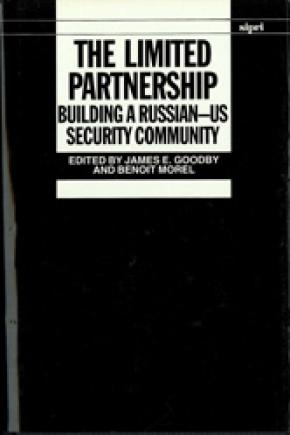The Limited Partnership: Building a Russian–US Security Community
Russia is the successor to the Soviet Union as a permanent member of the United Nations Security Council. It inherited the nuclear superpower status of the defunct Soviet state, much of its military establishment and most of its territory. The future of democracy, and of Russia, is at stake in the events unfolding across Eurasia. Most Western governments recognize that the present embattled transition to democracy and a market economy justifies Western economic help. It should be equally clear that US–Russian security relations must be put on a more stable and forward-looking basis. Co-operation in defence affairs could promote civilian control of Russia's military forces, a requisite part of the transition not only to a security community but also to democracy. Although conditions in Russia remain fluid and the ultimate destination of its transformation uncertain, now is the time to consider how a Russian–US security community could be constructed.
This book discusses the elements of a Russian–US security community. Practical—and difficult—problems stand in the way. The book describes the political traumas in Russia that accompanied revolutionary change and which still shadow future prospects. Interaction between the weapon technologies and military forces of Russia and the USA is an inescapable part of the geopolitical landscape. This is examined against a backdrop of how the military forces of the two countries may evolve in the next decade. The metastable condition of Russian–US relations, mathematically modelled in a chapter, underscores the need to rethink the basic nature of those relations so crucial to world peace. The book speculates on the new Russian–US security community in terms of transparency in military operations, doctrines, and strategies, closer co-ordination of defence planning, joint military exercises and extensive military-to-military contacts. It uses recent history for a prudent assessment of the limitations still attached to such activity.
Part I. Introduction
1. Introduction
James E. Goodby
2. The case for a Russian–US security community
Fred Charles Iklé
Part II. Regime transition: From cold war to co-operative security
3. History accelerates: The diplomacy of co-operation and fragmentation
William W. Newmann
4. Moscow's nationalities problem: The collapse of empire and the challenges ahead
Daria Fane
5. A national security policy for Russia
Sergey Rogov
6. The creation of a Russian foreign policy
Mikhail E. Bezrukov
7. Issues and images: Washington and Moscow in great power politics
David Kaiser
Part III. Military power and international stability
8. Theatre forces in the Commonwealth of Independent States
Edward B. Atkeson
9. US theatre forces in the year 2000
Edward B. Atkeson
10. High technology after the cold war
Benoit Morel
11. The metastable peace: A catastrophe theory model of US–Russian relations
Irving Lachow
Part IV. Building a new security relationship
12. Co-operation or competition: The battle of ideas in Russia and the USA
Steven Kull
13. Building a Eurasian–Atlantic security community: Co-operative management of the military transition
William W. Newmann and Judyth L. Twigg
14. Russian–US security co-operation on the high seas
Steven E. Miller
15. Defence planning: The potential for transparency and co-operation
Judyth L. Twigg
16. Some limits on co-operation and transparency: Operational security and the use of force
William W. Newman

